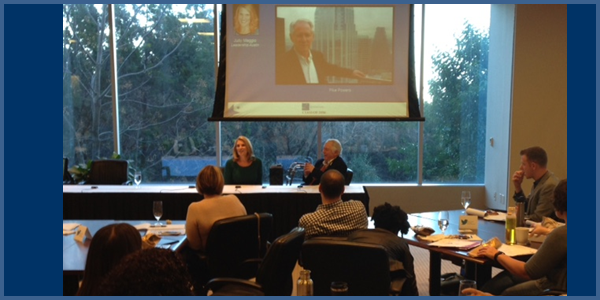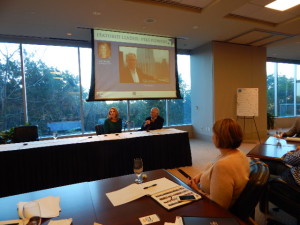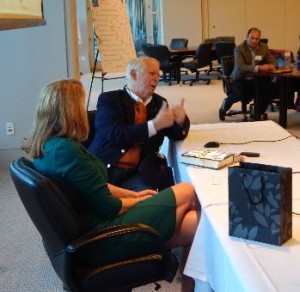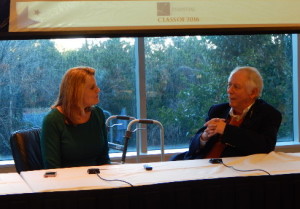
The Essential Class of 2016 spent a recent afternoon discussing Austin’s economy–past, present and future–in a compelling and lively conversation with local legend Pike Powers. As a lawyer/entrepreneur/legislator, Powers used his leadership to put Austin’s technology sector on the map and helped the city grow from a university town into a high-tech powerhouse.
Some insights from Powers:
Throughout the ’70s and ’80s we were struggling with being heard and being relevant. In the early days we were a sleepy college town with nothing going on except state government. Then a series of things happened where we could compete.
We had a group of smart people who led the University of Texas and the Chamber, and we determined we would take as much research money as we could get, in a specific area. As a consequence we ended up with an engineering school that is very competitive and first-class. And that made a huge difference to have that in our bag of tricks.
We also decided we weren’t going to chase dirty polluters. From that point forward from the late ’70s to the early ’80s, if you polluted the water or the air we really didn’t want you–because nobody wants to live in that kind of environment.
So the combination of those two things really put us in a different spot and allowed us to compete for Sematech and MCC, which led to AMD, Applied Materials, Samsung, and on and on and on. The underpinnings of the technology community were significantly emphasized through the university research and federal research money.
What we did right/wrong and how to remain successful
I wouldn’t trade anything for those 40 years. We’ve got a bucketload of problems, yeah…but who would trade places with Austin? We can do anything we want to do.
Professionally, personally, philosophically…I’ve made some version of the “Austin Texas” speech/conversation in 30 states and 5 foreign countries. And it’s amazing the goodwill and positive attitude that people have about this place. With all the challenges of affordability, and traffic and Lord knows what else…I wouldn’t trade places with anybody. It’s a great city, great future, great opportunity.
We have 7 or 8 universities totally over 200,000 students in this vicinity. That talent resource makes us competitive. I think our real challenge is not so much the money discussions…but the talent challenge. How do we get them, keep them, and make them productive participants?
What I’ve learned over the years: place matters. People want to be in a special place.
What would you tell the Pike from 30 or 40 years ago?
I didn’t know enough to know. I do have snippet memories. The first time someone tugged on my sleeve and said, “You need to go meet this guy Michael Dell…He’s over in the dorm laboratory. He’s got something called PCs Limited. We think he’s gonna go somewhere.”
I went and found Michael and had a very early talk with him. He said, “I’m going to take over the world, Pike. And I’m going to kick IBM’s ass.” First two things he ever said to me.
By the way…Dell is important to this community. They are identified with us and we are identified with them. If I can make one simple request, I think we need to support them everywhere we can, to make them an effective, competitive company in the future.
 The importance of civility and inclusion
The importance of civility and inclusion
I’ve learned the hard way…if you don’t have all the players in the boat you’re going to sink the boat. Early on I decided I would invite everyone in and if they choose not to participate that’s their call, but they at least have the opportunity to hear the story and know the facts and participate fully.
It’s the relationship piece…and I think it’s the heart and soul of Leadership Austin, if it’s done properly and effectively. Without that kind of concern, compassion and connection…you just don’t get there. You don’t have a place that matters.
Thoughts on Sematech moving to New York
My answer has really become: We are big boys. We are playing in the big leagues. If it betters the country and betters the original investment and it keeps the thing going, then I’m for it. I’m not going to be ticky-tacky-cheesy about criticizing New York or some of the things they did…we are all still doing things that matter. We’ve had a wonderful run. I wouldn’t trade it for anything. Let them have a piece of it. NYU needed to have an engineering school that mattered, so they’re going to finally have one.
Encouraging homegrown businesses vs. recruiting outside ones
You’ve got to do it all. It’s a big challenge and a great task. This book, R&D Collaboration on Trial (by David V. Gibson and Everett M. Rogers) helps explain. It’s about MCC and Sematech and their quest to enhance the competitiveness of the American high technology firms. I have no interest in it financially except these are local folks chronicling everything we did in the ’80s and ’90s to get some of these things done.
My point: we would not be able to have what we have now without the base. I’m more about creating a culture that addresses the perspective the right way. We’ve got a wonderful start. We’ve got great people. The future is bright. I wouldn’t try to parse it apart. Let it be, as the Beatles would say.
Modeling ourselves after Silicon Valley
Austin is a unique place. We have to devise our own plan, for our own contingencies, with our own people…and be thoughtful and listen to them. The point is we need our own plan, our own identity, our own future and not try to emulate or copy anybody.
 Thoughts on the Emerging Technology Fund
Thoughts on the Emerging Technology Fund
I helped write it and I was the vice chair when we started it. I’ll say that I think we were a bit naive. I’ll concede that we could have done it better. On the other hand, I was proud of our entrepreneurial stance. We took a risk and took a role. And Governor Perry…well I’ve worked for, with and around 8 governors…Rick Perry was phenomenal. He was a real leader on those issues. I’ve despaired the fact that it’s gone, but I couldn’t fix that part and it’s put together with the enterprise fund. I would do it all over again the same way…maybe a little stronger staff, a little better program in terms of third party looking in, but I never felt like I was told to do anything or told to vote for this program.
After working in private, public and nonprofit sectors, where have you had the most impact?
My best answer: I really don’t know. If I had to venture a guess I would say those experiences and opportunities prepared me to be a connector.
For me, it provided the opportunity to spread my wings and fly a bit. Looping, communicating, connecting…they are terribly important things. There’s no denying how much impact that had on my life. I skated into places that I probably shouldn’t have been permitted. The confidence that I could circle my colleagues and friends was always enough to say, “Let’s go for it. Let’s take a risk. Why not?”
Austin’s future
The digital age is dawned and we are here and we’ve got to figure out what the hell to do with it. We’ve got to have a more serious, long-term look at who we are. I think we need to take this moment and do a deep breath and set some priorities that are more comprehensive, more deliberate, more focused.
We’ve been lucky…crazy people like me who take the basketball down the court and any way I could get it in the basket I did. I think we now need a real plan…so we’re going to take the shot with two minutes left on the clock and Joe, our best shooter over here, right out of Hoosiers…and we’re going to make it. We need to be more deliberate and more focused about what we’re about.
What makes this place unique and different is that we are willing to take a risk–a cogent, considered, connected risk. A lot of places just can’t get there.
Final advice
The hardest thing for me is to listen effectively. I like the sound of my own voice a lot. What I try to do is to flat say, “I’m not going to talk for the next hour, and just listen to what everyone else says and try to take something significant away that is a difference maker.” We are at a frenzied time–with 130 people being killed recently in Paris, France–a frenzied time. To sustain the value of who we are, we really need to take this time to think, look and listen, and absorb it in a meaningful way so we can do something with these challenges and really make a difference.
Pike Powers was honored by Leadership Austin in 2007 with the Polly Scallorn Community Trustee Award.

